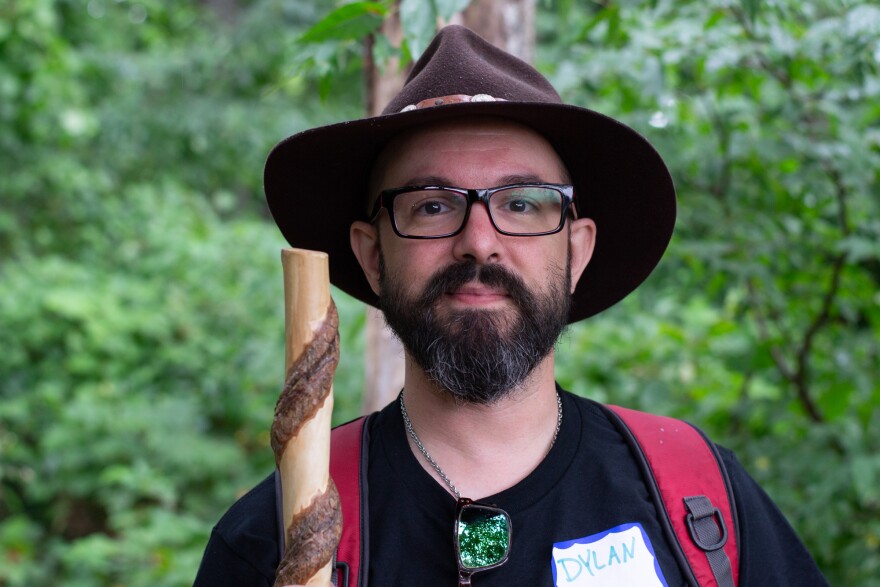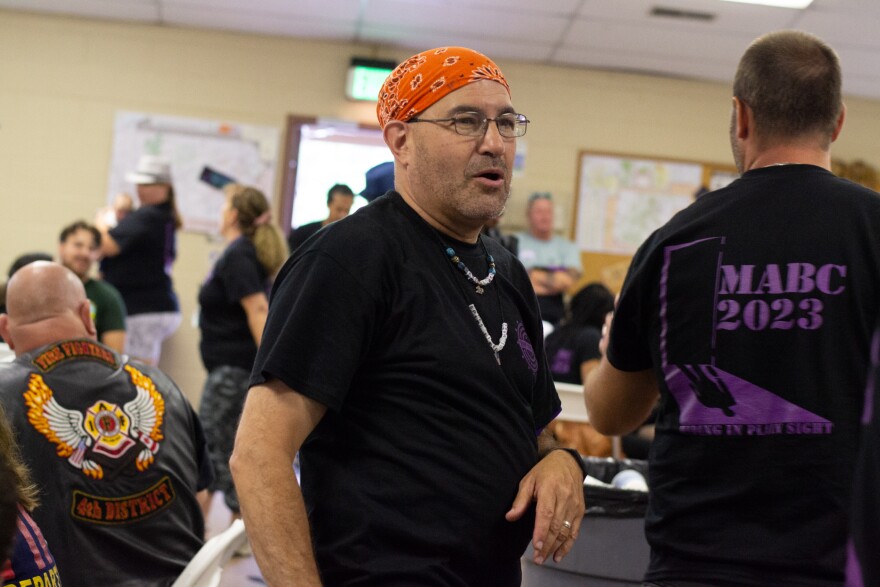For more than 30 years, child survivors of burns from across the mid-Atlantic region have come to the Shenandoah Valley for summer camp. WMRA's Randi B. Hagi reports.
The sounds of kids singing and pounding on tables rang out across the Brethren Woods Camp in Keezletown last week. Counselors passed out lyric books with numbered pages, so kids could call out a request for their favorite camp 'hymn' – such as "Proud Mary" and "Leaving on a Jet Plane."

[campers, counselors singing with ad libs and claps]
Ending each meal in song is one of many traditions honored each year at the Mid-Atlantic Burn Camp. It was founded in 1992 by physical therapists working at the Baltimore Regional Burn Center. The camp is specifically for children who have suffered a burn injury, so they can safely enjoy outdoor fellowship among peers with that shared experience, where scars are the norm.
DYLAN DUNNE: With a child that is a burn survivor, there's often a lot of teasing, and having the community of, everyone here has the same thing that you would normally get teased by, they have the support and the presence to be able to, like, if they're going into the pool, take their shirt off and not swim with a t-shirt on.

Dylan Dunne, of Baltimore, has been a counselor here for more than 15 years. He often chaperones the bus that starts in eastern Pennsylvania and picks up kids along its way to camp.
DUNNE: I haven't in my life seen a group of adolescents ever come together and support each other emotionally in the way that I have seen at camp. … These kids are talking to their peers in this specific peer group, and they are finding solace and welcome arms.
Much of this summer camp experience is like any other – with swimming, canoeing, and arts and crafts. But there's also specific care taken to teach cooking classes and build campfires, so the kids can gain confidence in settings that might bring up their trauma.

Thirteen-year-olds Jacob, from Dover, Pennsylvania, and Rodney, from Severna Park, Maryland, enjoyed horseback riding and beating an escape room.
JACOB: The atmosphere is very nice. I feel like I can connect with a lot of people who have had similar things happen to them.
RODNEY: I like the horseback riding and connecting with people.
JACOB: … I feel like a lot of us, it's not really, it doesn't affect us as much as people might think. It's just something that we live with.
I dropped by on Visitors Day, when the camp opens up to firefighters, flight paramedics, and other guests.
MATT TOBIA: Today we had our drone team out.
Matt Tobia is the chief of the Harrisonburg Fire Department.

TOBIA: Our drone team is focused on search and rescue missions as well as providing situational awareness on fires, but today, the kids got to fly drones.
Fire department personnel also serve as counselors and help fundraise for the organization, so that every child can attend burn camp for free.
TOBIA: You know, so often, firefighters encounter people when they're having the very worst day of their life. And firefighters see victims of burn injuries, individuals who suffer severe burns, and then they turn them over to the hospital, and oftentimes, they never know what happens to them again. And it takes an immense toll, emotionally, mentally, and physically on firefighters. … When firefighters get to see kids who are survivors, who are resilient, who are able to recover from their burn injuries – and know that they can have a role in saving that child's life and then helping that child find the new normal that comes after a burn injury – it's immensely satisfying.
That day, the kids also got to sit in a medevac helicopter – on the ground – and talk to the paramedics who pilot it, including Wynn Locher.

WYNN LOCHER: So, generally, we're going to go to UVa. It's our closest level one trauma center, that also handles people who are having a heart attack or a stroke. If someone's burned, then they'll go to VCU – that's our closest burn center. If we can't get into Richmond for some reason, then we're going to go to the burn unit at the D.C. children's hospital.
The bonds forged here are strong. According to one long standing counselor, once a camper starts attending, they're "ours," she said. Even if they move out of the region, the camp will fly them out each summer to keep them in the fold.
I talked to 15-year-old Aaliyah, from Baltimore, about those bonds while she worked on a crochet project in the arts and crafts cabin.
[music, kids talking in background]
AALIYAH: I first started with just a normal, regular stitch, but then I decided to go on to a double stitch, and I decided to make a blanket. Might have turned into a scarf, though, unfortunately.

HAGI: … It seems like there's almost like a sense of family here, compared to other summer camps. Does that, does it feel like that?
AALIYAH: Yeah, everyone's so nice here. Like home away from home, you know?
Tobia recounted one of the most poignant moments he's had in the more than 20 years he's helped with the camp.
TOBIA: One day, one of our science teachers pulled out a geode. Now, a geode as a closed sphere is ugly. It's a rock. … But when you cut a geode in half, and you slice it open and you look on the inside, it is full of the most beautiful crystals you can possibly imagine. And it was a teaching moment where the kids understood and got to see that what's on the outside doesn't have to define them.
And that's a lesson we can all embody.


